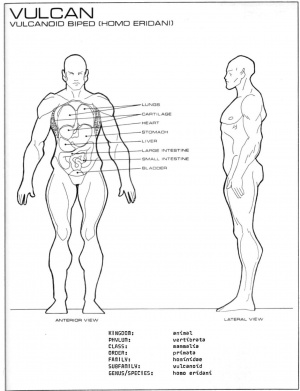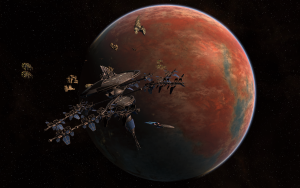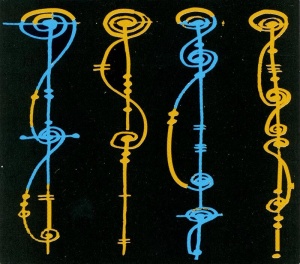Vulcan: Difference between revisions
From Star Trek: Theurgy Wiki
Jreeves1701 (talk | contribs) |
Jreeves1701 (talk | contribs) |
||
| Line 12: | Line 12: | ||
==Homeworld== | ==Homeworld== | ||
The planet Vulcan (or Ti-Valka'ain, in the Vulcan language) was the second plant of six orbiting the orange star 40 Eridani A (part of a trinary system; the other two stars were too far away to be immediately visible in Vulcan's sky). Vulcan was a harsh, desert world (barely a quarter of the surface area was water) with a thin atmosphere and high (1.4 G) gravity. Vulcan's geology produced starkly upthrust mountains: craggy, inhospitable, and inspiring to the planet's ascetic logicians and mystics alike. The capital city of Vulcan, ShirKahr, was a low, stark city laid out in logical grids and quarters around an ancient oasis. | [[File:Vulcan_with_starbase.png|thumbnail]]The planet Vulcan (or Ti-Valka'ain, in the Vulcan language) was the second plant of six orbiting the orange star 40 Eridani A (part of a trinary system; the other two stars were too far away to be immediately visible in Vulcan's sky). Vulcan was a harsh, desert world (barely a quarter of the surface area was water) with a thin atmosphere and high (1.4 G) gravity. Vulcan's geology produced starkly upthrust mountains: craggy, inhospitable, and inspiring to the planet's ascetic logicians and mystics alike. The capital city of Vulcan, ShirKahr, was a low, stark city laid out in logical grids and quarters around an ancient oasis. | ||
==History and Culture== | ==History and Culture== | ||
Revision as of 02:14, 23 January 2022
The Vulcans were a stoic, rational people. Widely claimed to be emotionless, in truth the Vulcans felt deeply and intensely, to their own detriment. Their stoicism came from a culture of logic and self-discipline, where emotions were analyzed and dissected to rob them of their potency so that they could not overwhelm or control the individual. Vulcans embraced science and reason, but their lives were not purely devoted to logic: they also had a deeply philosophical side, with art and music as vital to their culture as logic. They were also intensely private people, with many aspects of their culture — such as the rites of Pon Farr — which were not discussed amongst outsiders.
Personality
Vulcans exalted logic over emotion and usually repressed or sublimated emotions in their daily behavior. Vulcans who dealt with non-Vulcans on a regular basis often maintained an almost glacial calm, possibly as self-defense against so much unguarded feeling. Among themselves, however, Vulcans usually seemed more relaxed; Vulcan ambassadors often cultivated a kind of distant good humor and politesse. Even Vulcan ambassadors, however, had trouble predicting or depending upon the behavior of more emotional species.
Physical Description
Vulcans closely resembled Humans, with the same average height and weight. Their pointed ears were slightly larger than the Human norm, and their slanted eyebrows sometimes gave them a questioning look. The inner, or nictitating, eyelid was not visible. Vulcan skin complexions ranged from olive to dark mahogany, with a green cast provided by their copper-based blood. The Vulcan heart rested in the lower center of the torso, surrounded and protected by highly efficient lungs.
Homeworld
The planet Vulcan (or Ti-Valka'ain, in the Vulcan language) was the second plant of six orbiting the orange star 40 Eridani A (part of a trinary system; the other two stars were too far away to be immediately visible in Vulcan's sky). Vulcan was a harsh, desert world (barely a quarter of the surface area was water) with a thin atmosphere and high (1.4 G) gravity. Vulcan's geology produced starkly upthrust mountains: craggy, inhospitable, and inspiring to the planet's ascetic logicians and mystics alike. The capital city of Vulcan, ShirKahr, was a low, stark city laid out in logical grids and quarters around an ancient oasis.
History and Culture
Language and Names
Vulcan and Federation Standard was the dominant language spoken by Vulcans.
Vulcans used only given names, though in ritual greetings they added their parent's name (and sometimes more), as in Spock, son of Sarek, son of Solkar. Even Vulcans of extremely ancient and powerful families used no honorifics; aristocracy was illogical, and logically, anyone worth impressing should already know who you were without being reminded of your family's status.
Male Names
Delvok, Kov, Lojal, Sakar, Sakkath, Sanshiin, Sarek, Satelk, Satok, Savar, Skon, Solkar, Solok, Sonak, Sopek, Soral, Soval, Spock, Stonn, Surak, Sybok, Tavin, Tolaris, Tuvok, Vanik, Vorik
Female Names
Saavik, Sakonna, Selar, Senva, Sitak, T'Lar, T'Lara, T'Pan, T'Para, T'Pau, T'Pel, T'Penna, T'Pera, T'Plana-hath, T'Pol, T'Pring, T'Shanik, Tallera, V'Lar, Valeris




